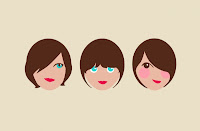So allow me to explain why I’m always broke:
- I'm 22.
- Amazon has really perfected the art of recommendation.
The Mediator by Meg
Cabot.
Meg. Cabot.
Why did forgetting about my one-time favourite author
make me feel so guilty, you might ask? Because, Meg Cabot was one of a handful of authors who
inspired my young feminist self with her kick-ass teen-aged heroines. I didn't know
it at the time; I didn't even know I was a feminist, really.
Meg eased me in with her breakout series; The Princess Diaries. Mia Thermopolis
was awkward and different, and she was a princess.
I was awkward! I wanted to be a princess!
10 year-old me was hooked.
Pretty soon I was reading every Meg Cabot book I could get
my hands on. Next up was The Mediator,
and then All American Girl, and then
my personal favourite; Avalon High.
Meg’s characters were my fictional role models. They were
independent and clever and motivated. They all had such a strong sense of their
own morals, and they were entirely the heroes of their own stories. Not to mention;
they were consistently sarcastic, which to a pre-teen is the epitome of 'cool'.
Best of all, her heroines became stronger and livelier with each new release.
Mia Thermopolis
"I am the
princess of Genovia. I am the newly elected head of the AEHS student council. And
NO ONE – not even Michael – is going to tell me when to Do It."
In The Princess Diaries, Amelia ‘Mia’ Thermopolis, a
fourteen year old “nobody” finds out that she is heir to the Genovian throne.
Mia can barely get the pretty head cheerleader Lana Weinberger to stop picking
on her for five minutes – how can she be expected to rule a country?
But rather than morphing into a 1950's Disney character, Mia finds
herself empowered by the tiara thrust upon her head. Over the next four years (and ten
books), we see her lead the student council, befriend the outcasts, defend the
meek, stand up to bullies and grow into a passionate and ambitious young woman.
Sam Madison
“I mean, instead of
sitting in the White House press office for three hours after school every
Wednesday, or attending International Festival of the Child concerts, I could
have been out there alerting the public to the fact that in some countries, it
is still perfectly legal for men to take teen brides -- even multiple teen
brides! What was that all about?”
Samantha ‘Sam’ Madison is the charmingly defiant and artistic protagonist of All-American Girl. She
spends her days dying her entre wardrobe black and sketching commissioned
portraits of celebrities in her German notebook. But in a chance encounter
outside an Art studio, Sam saves the life of the US President – and is quickly
labelled a ‘hero’.
The best thing about Sam is that she refuses to conform to
the common perception of what a hero should be. Sam is glad to have saved her
country’s leader – but she won’t compromise who she is for him. Throughout the
book and its sequel, Samantha stands up for what she believes in. When she’s
asked to be the Teen Ambassador to the UN, she plans to use her position to
inspire her generation. When she’s asked to endorse the President’s ‘Back to Family’
bill – a cause she doesn’t agree with – she is blunt and honest when
interviewed about it, even though her views may be unpopular. Sam is a hero –
just not the kind of hero anyone expected her to be.
Ellie Harrison
“He was supposed to be this great
innovative thinker who wouldn’t do things the way people told him they had to
be done, because that’s the way they’d always been done. If Will really is
Arthur—and I’m not saying he is, because I think this whole thing is wack—would
he really just sit back and say, ‘Oh, well, I can’t change this, because no
one’s ever done it before,’ and just leave you to die? No, he wouldn’t. And you
know what, Mr. Morton? I’m not going to, either.”
Elaine ‘Ellie’ Harrison is the new kid at Avalon High, where her blossoming social
life begins to draw major parallels with Arthurian Legend. It quickly becomes
apparent that her insta-crush Will and his friends might just be King Arthur
and his court reborn. When “the forces of evil” threaten to destroy an
unsuspecting Will, Ellie finds that she plays a much bigger part in the legend
than anyone imagined.
Ellie is athletic, and laidback (her favourite
past time is floating), and unfalteringly compassionate. In the end, she is not
the ‘hero’ of the story in the most traditional sense – Will is King Arthur
incarnate. But Ellie is The Lady of the Lake. She is his saviour, his rock, and
to quote blogger Erin Callahan, the “Smart Girl Who Figures It Out and Saves
The World By Not Backing Down.” Ultimately, she played the most important part
in the story.
I’m so excited to have re-discovered Meg Cabot - she’s inspiring me all over again! As someone who writes YA fiction, my greatest aspiration is
to move my young audience in the way that Meg moved me. I know she never really
went away, and I know plenty of people read her newer stuff, but to me - re-reading all the books I loved as a kid - this is her grand comeback.
“I don’t know where
these people have been, but princesses have been rescuing themselves in fiction
for quite some time now.”
- Meg Cabot













